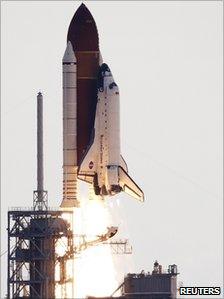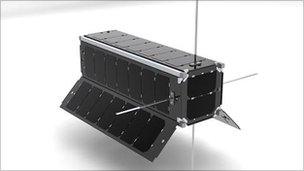'Space Oscars' boost for Scottish specialists
- Published

It is hoped Scotland could benefit from the end of the US shuttle programme
A spacecraft producer and a space laboratory have shone brightly as two new stars of Scottish industry at a ceremony this week.
Clyde Space and Strathclyde University's Advanced Space Concepts Laboratory won top awards at the UK Space Conference in Warwick.
The "Space Oscars", as some call them, have come as a welcome boost to Scotland as it attempts to blaze a trail in space technology.
The sky could indeed prove to be the limit for those Scots who reach out to the final frontier.
The space industry in the UK is estimated to contribute about £6bn a year to the UK economy, supporting almost 70,000 jobs directly and indirectly across the country.
And some observers suggest space activity in the UK could grow into a £40bn industry over the next 20 years.
Scotland seems well positioned to tap into that potential - Glasgow alone is believed to host one of Europe's largest clusters of space systems engineering researchers.
Clyde Space, which won the Sir Arthur C Clarke award for achievement in space commerce, is one Scottish company which has already secured a healthy position in a niche market.
CubeSats
Earlier this year, it secured a funding package worth £1m for developing high-quality, high-performance systems for very small spacecraft called "CubeSats".
The company, which was formed five years ago, has already built up a 30-40% market share of the global CubeSat power market.
About 50% of turnover at Clyde Space is from the sales of power components for larger spacecraft, including power controllers, batteries and solar panels.
The award win was far from a fluke for the Scottish space technology sector.
At the same ceremony, Strathclyde's Advanced Space Concepts Laboratory collected the Sir Arthur C Clarke award for achievement in space research.
The laboratory undertakes frontier research on "visionary" space systems.
Opened in 2009, its researchers are investigating how new space technologies can be used to deliver radically new space services, such as increased telecommunications capacity and new orbits for Earth observation and space science missions.
Niche markets
Laboratory director Professor Colin McInnes said he was delighted at the UK Space Conference award.
"I think there is a recognition in the UK that there are interesting things happening in Scotland," he said.
Prof McInnes said Scotland could do well in the space technology sector by focusing on niche markets.

Clyde Space is expanding its CubeSat capabilities with UKube1
He said: "It is like other sectors of the economy, where you may not have the dominance of the large players but you can do something in niche areas.
"I think many companies in Scotland do not consider space as a potential market for their business but there are certainly opportunities to get involved in the supply chain for the space industry, for example in electronics software."
Strathclyde University is fast developing space technology as a speciality.
This week it launched a Centre for Future Air-Space Transportation Technology (cFASTT), bringing together a multi-disciplinary team of engineers and scientists to research technologies for tomorrow's high-speed airliners and access-to-space systems.
'Fantastic opportunity'
Centre director Professor Richard Brown believes that with the US space shuttle programme winding down, Scotland has "a fantastic opportunity" to play its part in advancing technology into the next of age of space travel.
He said: "The programme was not without severe technological and economic problems and at Strathclyde, with the launch of the cFASTT Centre, we will be able to develop the crucial technologies that will address these issues and redesign the shuttles of the future.
"It is crucial that we draw inspiration from the airline industry and look at designing space craft that are re-useable and thus more affordable.
"If this can be achieved, and we believe it can, then it will radically change our ability to enter space and a world of opportunity awaits."
Meanwhile, Clyde Space is gearing up to take advantage of that world of opportunity.
The company is aiming to expand its CubeSat capabilities with UKube1, a 5kg satellite being developed and built in Glasgow in conjunction with Strathclyde University for the UK Space Agency.
- Published1 February 2011
- Published22 June 2010
- Published10 January 2011